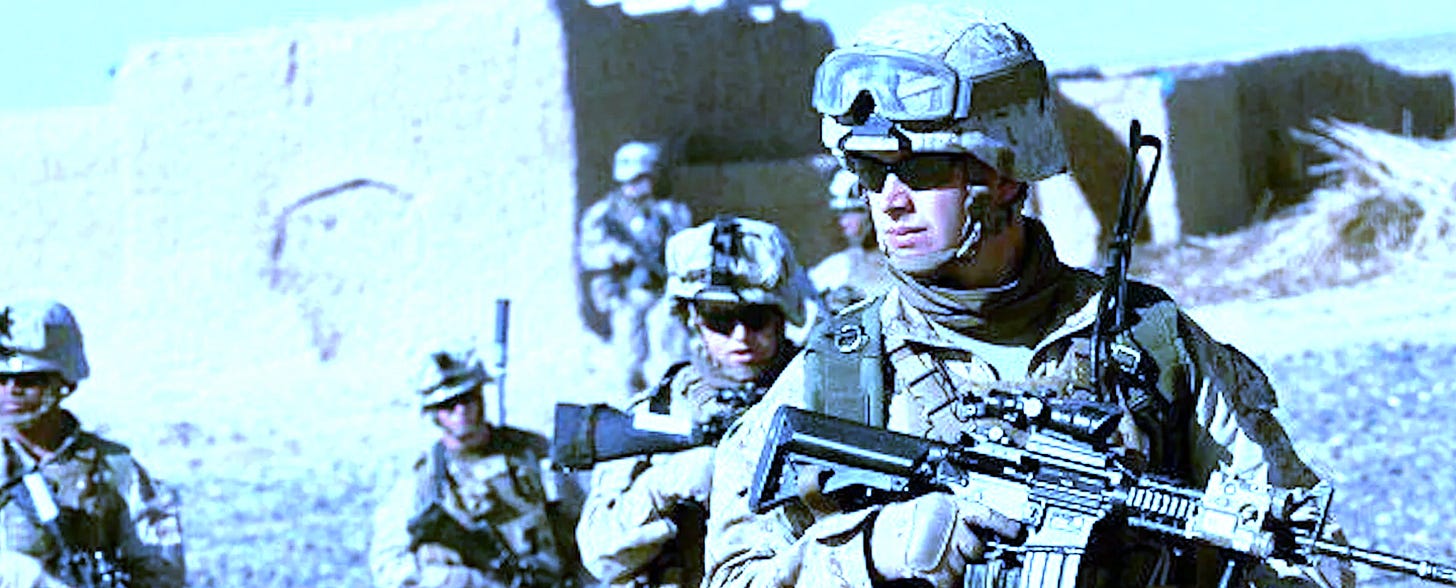It was supposed to be a day trip, but you never knew.
Robert, obsessed with the film Black Hawk Down, lectured Jason constantly about preparedness whenever they left the base—those guys thought it was a quick afternoon jaunt, and look at what happened to them!
CHARIKAR BY JOSHUA FOUST 34THPARALLEL MAGAZINE ISSUE 27
Jason had the day off. This was new to him—in the five weeks he’d been in Afghanistan, he had worked every single day. He woke up really early, much earlier than he needed to, so he could get breakfast. Normally breakfast is not that big of a deal, but because this was his day off, he could eat alone—no bullshit shop talk, no need to feel socialable and friendly to his compatriots, no burned-out husk of a security contractor eagerly catching him up on the latest travails of child support and alimony that could only be afforded by years of constant deployments. Hewas going to eat his breakfast in blissful silence.
It gave him a chance to think. Jason hadn’t had a chance since arriving at Bagram last month. He had spent Christmas at his computer, working to read mission reports when he couldn’t interview soldiers, policemen, or prisoners at the scary CIA jail. At night, he Skyped home to say hi, which was enough even though the connection dropped halfway through. That was military life for him, or at least what passed for it as a civilian.
Jason occupied an awkward middle place in the hierarchy of stereotypes in the warzone. He wasn’t a uniformed soldier, so he couldn’t skip to the front of lines (like when boarding the plane at Ft Benning), but he also wasn’t a dirty contractor so he wasn’t forced to be last for everything on the assumption that his life was otherwise perfect and without worry. Pentagon civilians are the Goldilocks of warfighting: just good enough to avoid active scorn, but not True Heroes like the guys in ACUs with machine guns.
He rolled out of his bed—they had real mattresses here, and real sheets if you cared enough to ever launder them—and put on his slippers for the shower. This early, when the sun was only an ochre smear on the sawtoothed mountain skyline, there was plenty of hot water (another luxury Jason fully intended to enjoy). Better still, no one else was in there. Jason hated the idea of group showers. He never felt much like a part of the scene here, so random bros seeing his dick as he toweled off held almost no appeal.
It was still gloomy when Jason put his clothes on and headed down the gravel alleyway to the dining hall. As he walked along, signs of life stirred in the base: the rumble of trucks along Disney Drive, the main street that bisected Bagram into a town of sorts on one side and the airport that gave it its name on the other. Young women in Air Force sweatsuits jogging along the sidewalk. Enlisted teenagers speedwalking into office buildings. Foreign Legionnaires catting about in sporty-looking amphibious jeeps. Herds of identical looking men in their grey army workout suits queuing up to enter the breakfast area.
Jason got in line. He tried hard to look invisible. The actual soldiers always gave obvious civilians the side-eye in line, and he preferred not to attract attention to himself. Once, while he was taking a dump in the bathroom at a local brigade headquarters, he overheard two sergeants talking about the civilians that had flocked here as Iraq wound down. “They’re like fucking ants, man,” one had said, the other agreeing in between grunting as he squeezed out more poop. It stuck with him, this sense that so many of the bushy-bearded men—they were almost always men—in blue jeans and Han Solo-style pistol holsters and construction boots and khaki shirts were little more than pests to the troops.
By the time Jason swiped by access card to get into the cafeteria, waited in line for stale bacon and soggy hashbrowns and runny eggs and toast and partially frozen cantaloupe and burned coffee, the place had filled up. The only table was in the back, a cute little two-seater nestled between two groups of boisterous young men still sporting sweat stains from their morning run.
He sat, swirling creamer into his coffee before melting sugar in the styrofoam cup, splurting glops of ketchup on his plate in absolute silence.
At the table next to him the conversation had blurred into nonsense, the same sort of empty banter that accompanied any talking of shop in a war zone. It drifted at random, filled with forced witticisms and false charm, and put Jason into a dark mood.
He stood up suddenly, the screech of his chair on the linoleum floor startling the table behind him. He turned around sheepishly. “I’m going to go enjoy my morning.”


